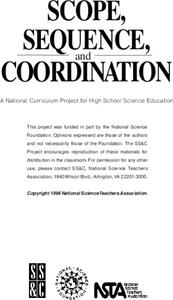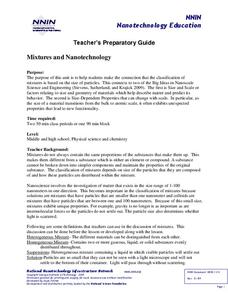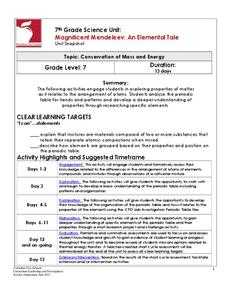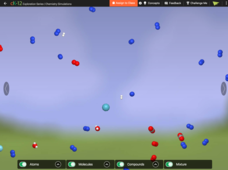Lane Community College
Review Sheets: Beginning Algebra
This jumbo worksheet contains everything you need to get through Pre-Algebra. Begin with simple expressions, and end with linear functions and polygons. There are multiple problems for each topic to make sure those skills are set.
Scholastic
Study Jams! Mixtures
Mix it up at a party as Sam and Zoe discuss heterogeneous and homogenous mixtures and solutions. Follow this film by allowing your class to put together individual snack foods to make their own mixture!
Curated OER
Recognition and Classification of Mixtures
Immerse your chemistry class in solutions! They melt and compare the mixtures that make up margarine, separate black ink into its component colors, distill ocean saltwater, and practice chromatography with plant pigments. There are eight...
Curated OER
Matter and Energy
Does the change in energy of matter lead to a change in mass? Upcoming chemists compare the mass of equal-volume, but different-temperature liquids and materials both before and after a chemical reaction has occurred. In another...
Curated OER
Density Studies of the Earth
Density comes to life as investigators place soda cans into containers of various liquids to find if they sink or float. They layer different density liquids, compare densities of different gases, and more. A total of six different...
Beyond Benign
Shampoozled—Part 1: Formula Calculation
Time for your classes to show off what they've learned! The 11th installment in the series of 24 uses concepts learned in the previous 10 lessons to create the perfect shampoo formula. Their formulas consider both sustainability and...
PBS
Categorizing Matter | UNC-TV Science
Take the difficulty out of classifying matter with an easy-to-follow activity that makes distinguishing between pure substances and mixtures simple. Scholars explore how matter is grouped between two categories—pure substances and...
American Chemical Society
Chromatography - Color Clues
Here's an activity that will change how one sees color. Pupils try out an experiment on chromatography where they place a drop of food coloring on a coffee filter, add several drops of water, and watch the colors spread and separate....
American Chemical Society
Dissolving M-and-Ms
Learning ... how sweet it is! A hands-on lesson uses colored candies to demonstrate how positive and negative charges interact. Pupils use different types of liquids and watch as the color from the candies spreads—or doesn't.
American Chemical Society
Conservation of Mass
It may take up less space, but the mass stays the same. Tackle a common misconception about conservation of mass using a hands-on lesson. Learners measure the mass of substances before and after melting, dissolving, and undergoing a...
American Chemical Society
Forming a Precipitate
Things are getting a little slippery in an inquiry-based lesson studying precipitates. Learners use soap and Alka-Seltzer tablets to create different mixtures with water. They then study the properties of the mixtures including their...
Pingry School
Liquid Chromatography
A hands-on experiment applies chromatography to separate both the colors and components of grape-flavored Kool-Aid. Performing two separate activities, learners first use chromatography to divide the colors. The second activity results...
National Nanotechnology Infrastructure Network
Mixtures and Nanotechnology
What does size have to do with it? Learners analyze different mixtures, both homogeneous and heterogeneous, to discover the properties related to the size of their particles. The activity connects these properties to those of...
Teach Engineering
Messin' with Mixtures
Do you separate your trail mix before eating it? Then you've been separating mixtures your whole life! Scholars model a contaminated soil sample using trail mix and estimate the percentage of each component. They consider how to clean up...
Teach Engineering
Properties of Mixtures vs. Solutions: Mix It Up!
Now it becomes crystal clear why the unit is called Mixtures and Solutions. The fifth installment of a six-part unit explores mixtures and solutions. After viewing a demonstration on mixing pebbles with water, salt with water, and...
Science 4 Inquiry
All the Small Things
Scholars use sorting cards to try to define a pure substance versus a mixture. Risk becomes reward as they observe the differences and create a flowchart sorting matter into mixtures and pure substances (elements and compounds).
Cornell University
Unknown Powders
Create a little scientific magic within your classroom! Learners mix powders and liquids and identify chemical reactions. Based on the reactions, individuals determine the identity of various powders.
Concord Consortium
Oil and Water
If you don't get along with someone, it's said that the two of you are like oil and water. Why is this? Explore the phenomenon and explain the phrase in one resource! Science superstars first observe samples of oil and water together....
Fuse School
Quiz: Emulsions
Ready to mix it up? Learners step up to the plate and show what they know in the 12th installment of a 14-part series covering the states of matter. The quiz contains four questions testing the basics of emulsion chemistry.
LABScI
The Separation Lab: Candy Colors
There's no better motivator than candy! An engaging activity has pupils explore methods for separating mixtures. A two-part lab first explores methods of separation based on size and magnetism. The second activity introduces learners to...
Columbus City Schools
Magnificent Mendeleev: An Elemental Tale
Discover how the periodic table tells the story of its elements. Learners begin by studying the makeup of several mixtures. Their analysis leads to a discussion of elements and the periodic table. As they dig deeper, they understand the...
CK-12 Foundation
Air Matters
What makes up the air we breathe? Young scientists explore the atoms and molecules in the air. An interactive lesson allows individuals to watch the movement of the particles in the air and change the makeup from a mixture to a compound....
Teach Engineering
Concentrate This! Sugar or Salt...
Heat up your lessons on boiling points. The resource provides a three-part activity: first, groups find the boiling point of solutions; second, they create boiling point curves for salt and sugar solutions; and third, they mix a solution...
EngageNY
Mixture Problems
What percent of the mixture is juice? Pairs use their knowledge of proportions to determine what percent a mixture is juice given the percent of juice in the components. Pupils use the procedure learned with the juice mixture problem to...

























